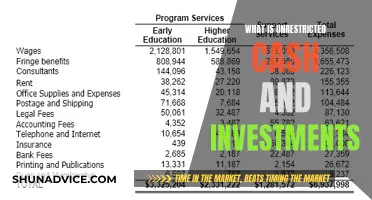
Holding cash reserves is an important part of financial planning for both individuals and businesses. Cash reserves are funds set aside in case of an emergency or unexpected financial need. For individuals, this could mean keeping enough cash to cover expenses for at least three to six months. For businesses, cash reserves are crucial for maintaining financial stability and handling unforeseen expenses, such as customer insolvencies, unpaid invoices, and dips in revenue. While cash reserves can provide liquidity and quick access to funds, there are also potential downsides, including lower returns compared to other investments and the risk of missing out on investment opportunities. Therefore, it is essential to carefully consider the amount of cash to hold in reserves and strike a balance between accessibility, security, and maximizing returns.
| Characteristics | Values |
|---|---|
| Purpose | Emergency funding, large purchases, short-term and emergency funding needs, investment opportunities |
| Amount | Enough to cover 3-6 months of expenses, or 5-20% of your portfolio |
| Types | Cash, short-term investments, liquid assets |
| Storage | Bank accounts, treasury bills, money market funds, certificates of deposit, stocks, bonds |
| Advantages | Quick access to cash, liquidity, financial stability, ability to respond to urgent needs/opportunities |
| Disadvantages | Lower returns, missed investment opportunities, detrimental to business growth |
What You'll Learn

Emergency funds
The recommended amount for your emergency fund varies depending on your financial situation, expenses, lifestyle, and debts. Most experts suggest having three to six months' worth of living expenses readily available in a safe, easily accessible, and low-risk account. This account should be separate from your regular checking or savings accounts.
Some experts, like Suze Orman, recommend a larger cushion of up to eight months' worth of expenses, especially if you are the sole breadwinner in your family. If you have people who depend on you financially, it is advisable to have at least six months' worth of expenses saved.
When building your emergency fund, it is essential to start early and set aside a comfortable amount from your salary each month. You can also take advantage of tax refunds or other windfalls to boost your savings.
In addition to your emergency fund, it is a good idea to have some physical cash on hand. It is recommended to keep between $100 and $300 in your wallet and about $1,000 in a safe at home for unexpected expenses.
Investing in Startups: Strategies for Cash-Strapped Investors
You may want to see also

Liquidity
Short-term, highly liquid investments, such as money market funds, treasury bills, and certificates of deposit, are also considered cash reserves due to their high liquidity and short maturity dates. These investments can be quickly converted into cash, typically carry low risk, and increase liquidity without sacrificing safety.
For individuals, cash reserves are typically held in bank accounts or short-term, stable investments that are unlikely to lose value. This ensures that emergency funds can be withdrawn or sold at any time without losing money, regardless of stock market performance.
For businesses, maintaining adequate cash reserves is crucial for financial stability and growth opportunities. It allows them to seize growth opportunities, such as expanding to new markets or acquiring another business, without taking on debt. Cash reserves also enable businesses to manage operational risks and take advantage of discounts on bulk purchases.
However, holding too much cash in reserves can be detrimental. It can lead to missed opportunities and lower returns compared to other investments. Therefore, it is important to strike a balance between maintaining sufficient liquidity and maximizing the potential for higher returns.
Free Cash Flow: Investment Costs and Their Inclusion
You may want to see also

Peace of mind
Emergency Fund
An emergency fund is essential to provide a safety net during financial crises or unexpected expenses. As a general rule, individuals are advised to set aside enough cash to cover at least three to six months' worth of living expenses. This ensures financial stability and prevents the need to sell assets or investments at a loss during difficult times.
Retirement Planning
For retirees, having a sufficient cash reserve provides peace of mind that they can weather economic downturns or periods of market volatility. It is recommended that retirees maintain a cash reserve that can cover one to two years' worth of living expenses, in addition to their regular spending accounts. This ensures they have liquid assets readily available and are not forced to sell investments during a market downturn.
Stability and Flexibility
Holding cash reserves can provide stability to an investment portfolio, particularly during market disruptions or fluctuations. It allows investors to take advantage of new investment opportunities without having to sell other assets. Additionally, cash reserves can serve as a buffer against negative stock and bond market performance, providing flexibility and peace of mind.
Liquidity and Opportunity
Cash is the most liquid form of wealth. Holding cash reserves ensures individuals and businesses can quickly adapt to changing circumstances, make large purchases, or cover unexpected expenses. It also provides the opportunity to invest in assets at a lower price during a market decline, allowing for potential gains when the market recovers.
Personal Risk Tolerance
Each individual has a unique risk tolerance when it comes to investing. Holding cash reserves can provide peace of mind for those who are risk-averse. It allows them to feel secure, knowing they have a cushion to fall back on, which can help them make more objective and disciplined investment decisions.
In summary, holding cash reserves is an important aspect of financial planning that can provide peace of mind by offering stability, flexibility, and liquidity. It helps individuals and businesses navigate unexpected expenses, market volatility, and economic downturns, ensuring they have the resources to weather financial storms and take advantage of new opportunities.
Cashing Out Your GCash Investments: A Step-by-Step Guide
You may want to see also

Avoiding missed opportunities
Holding too much cash in reserve can lead to missed opportunities. While cash reserves are important for emergency funding, too much can be detrimental. Hoarding excess cash can result in lower returns than if you had reinvested that money back into your business or other investment opportunities.
For example, if you have $10,000 in cash reserves, you could be missing out on the potential for higher returns by investing it in stocks, bonds, REITs, gold, or other asset classes. Over time, the difference in returns becomes noticeable due to inflation and the power of compound interest.
To avoid this, it is important to strike a balance and not hold too much cash in reserve. For individuals, it is generally recommended to have enough cash reserves to cover three to six months' worth of expenses in case of an emergency. For businesses, the recommended amount is similar—three to six months of operating expenses.
By maintaining this balance, you can ensure you have sufficient funds for emergencies while also maximizing the interest earned on your money and taking advantage of other investment opportunities.
Additionally, consider keeping your cash reserves in high-interest savings accounts or investing them in low-risk, highly liquid assets such as treasury bills or money market funds. These options provide better returns than regular savings accounts while still offering quick access to your money when needed.
Remember, the key is to find the right balance between having enough cash reserves for emergencies and not missing out on potential investment opportunities that could provide higher returns.
How Cashing Investments Affect Debt Service Coverage
You may want to see also

Inflation and returns
The impact of inflation on cash reserves needs to be carefully considered. Inflation erodes the purchasing power of money over time. If the inflation rate exceeds the interest earned on a savings or checking account, an investor loses money in real terms. For example, if a saver has $100 in an account with a 1% annual interest rate, they will have $101 at the end of the year. However, if the inflation rate is 2%, the saver would need $102 to maintain their purchasing power. As a result, they have effectively lost money due to inflation.
Over the long term, cash has struggled to keep up with rising prices, while stocks and bonds have historically delivered average annual returns that exceed the rate of inflation. This means that holding cash reserves as a long-term investment strategy may not be optimal, as it could result in missed opportunities for higher returns.
However, it is important to note that cash reserves can still serve a valuable purpose in an investment portfolio. They provide liquidity and safety, especially for short-term goals and emergencies. For individuals, it is generally recommended to hold enough cash reserves to cover at least three to six months' worth of expenses. This emergency fund ensures financial stability and can prevent the need to sell other investments at a loss during market downturns.
Additionally, in times of rising inflation, it is crucial for businesses to ensure their cash reserves are earning competitive returns. Higher inflation rates can incentivize businesses to seek alternative investment options that offer higher returns, potentially at the cost of reduced liquidity.
In summary, while cash reserves provide stability and liquidity, they may not be the best option for long-term investment goals due to the impact of inflation and the potential for lower returns compared to other investment options. However, they remain an essential component of a well-diversified portfolio, especially for short-term needs and unexpected expenses.
Owner's Investment Cash: Operating Activity?
You may want to see also
Frequently asked questions
Cash reserves are funds that a company or individual keeps to cover short-term and emergency funding needs. They are highly liquid and can be quickly accessed and used for large purchases or unexpected payments.
Cash reserves provide financial stability and ensure liquidity. They allow individuals and companies to respond promptly to emergencies or unexpected expenses without having to sell assets or take on debt. Cash reserves can also help cover short-term costs and finance investment opportunities.
Holding too much cash can lead to missed investment opportunities and lower returns compared to other investments. Cash reserves may not keep pace with inflation, resulting in a loss of purchasing power over time. Additionally, there is a risk of mismanagement, leading to insufficient reserves or excessive hoarding, both of which are costly.
The amount of cash reserves depends on individual circumstances and needs. Generally, it is recommended to hold enough cash to cover three to six months' worth of expenses. For investors, it is common to keep between 5% and 20% of their portfolio in cash, while some may hold up to 30%.







